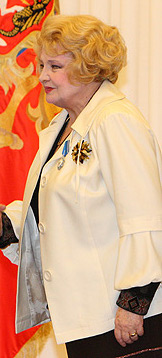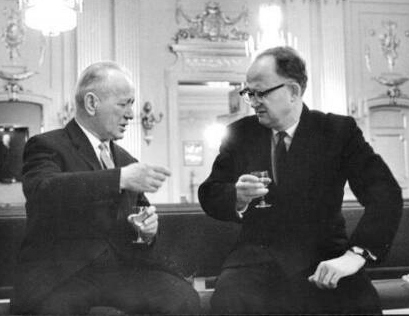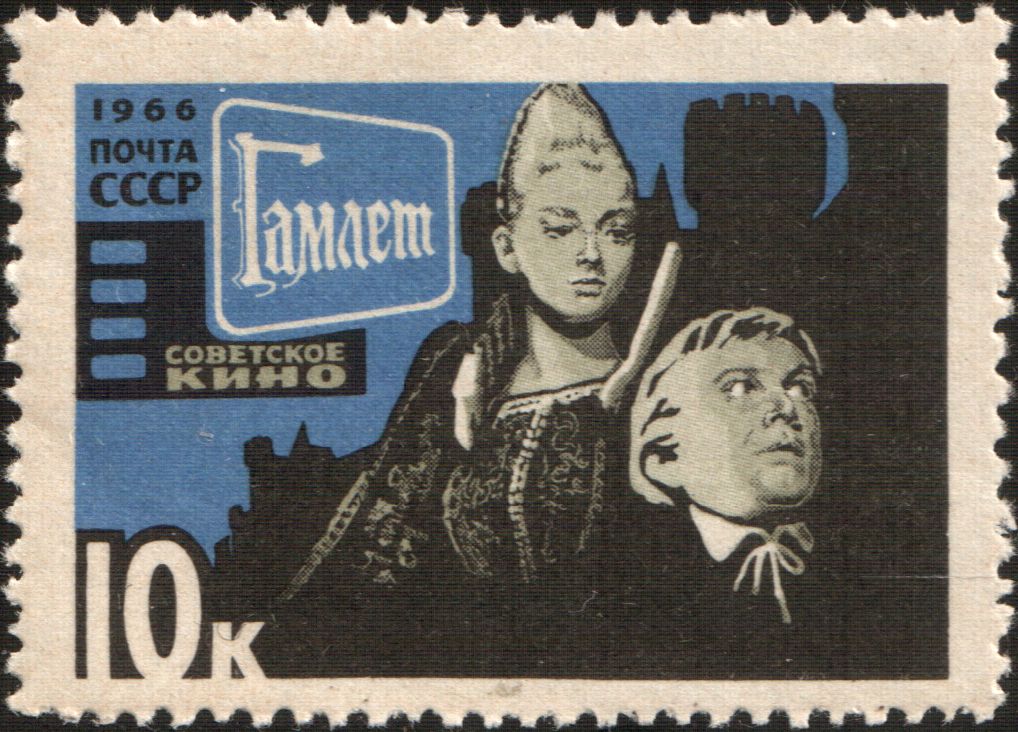|
Oleg Borisov
Oleg Ivanovich Borisov (russian: Оле́г Ива́нович Бори́сов; 8 November 1929 – 28 April 1994) was a Soviet and Russian stage and film actor. People's Artist of the USSR (1978). Biography Childhood and youth Oleg Borisov was born Albert Ivanovich Borisov on 8 November 1929 in Privolzhsk, Ivanovo Oblast. His given name was Albert, which was chosen by his mother in honor of the Belgian prince Albert, who visited Moscow in 1929. His parents were agricultural professionals. His mother, Nadezhda Andreyevna, was an agricultural engineer, and also played as an amateur actress at a local drama. His father, Ivan Borisov, was a wounded World War II veteran, who worked as director of Privolzhsk Agricultural Technical School. Becoming an actor Young Oleg Borisov was fond of acting and theatre, he was known as a good impersonator and comedian among his classmates at school. However, during the Second World War young Oleg Borisov was a tractor driver at a collective farm ... [...More Info...] [...Related Items...] OR: [Wikipedia] [Google] [Baidu] |
The Train Has Stopped
''The Train Has Stopped'' (russian: Oстановился пoeзд, Ostanovilsya poezd) is a 1982 Soviet drama film directed by Vadim Abdrashitov and written by Aleksandr Mindadze. The last film role of Anatoly Solonitsyn. Before the official premiere the film was shown in spring of 1982 at the Concert Hall of the Moscow Institute of Physics and Technology. Plot Late at night, a train accident happens. Four empty lorries suddenly roll down a slope and crash into a passenger train on high velocity. Only driver Timonin's courage, who until recently remained in the cabin of the locomotive and applied the emergency brake, helped to avoid a colossal calamity. However, the driver himself has died. The tragedy is investigated by the detective German Ermakov. In his hotel room Ermakov meets with journalist Igor Malinin, one of the passengers of the ill-fated train. The subject of their conversation, of course, becomes the wreck. Malinin writes an enthusiastic article about the heroism ... [...More Info...] [...Related Items...] OR: [Wikipedia] [Google] [Baidu] |
Tatiana Doronina
Tatiana (Tatyana) Vasilyevna Doronina (russian: Татьяна Васильевна Доронина; born 12 September 1933) is a popular Soviet/Russian actress who has performed in movies and the theater. She is generally regarded as one of the most talented actresses of her generation and was named a People's Artist of the USSR in 1981.Татьяна Доронина в энциклопедии «Кругосвет» Biography Doronina was born in , (now present-day |
Mikhail Sholokhov
Mikhail Aleksandrovich Sholokhov ( rus, Михаил Александрович Шолохов, p=ˈʂoləxəf; – 21 February 1984) was a Russian novelist and winner of the 1965 Nobel Prize in Literature. He is known for writing about life and fate of Don Cossacks during the Russian Revolution, the civil war and the period of collectivization, primarily in his most famous novel, '' And Quiet Flows the Don''. Life and work Sholokhov was born in Russia, in the "land of the Cossacks" – the Kruzhilin hamlet, part of stanitsa Vyoshenskaya, in the former Administrative Region of the Don Cossack Host. His father, a Russian, Aleksander Mikhailovich Sholokhov (1865–1925), was a member of the lower middle class, at different times a farmer, a cattle trader, and a miller. Sholokhov's mother, Anastasia Danilovna Chernikova (1871–1942), the widow of a Cossack, came from Ukrainian peasant stock (her father was a peasant in the Chernihiv oblast). She did not become literate until a ... [...More Info...] [...Related Items...] OR: [Wikipedia] [Google] [Baidu] |
And Quiet Flows The Don
''And Quiet Flows the Don'' (''Quiet Flows the Don'' or ''The Silent Don'', russian: Тихий Дон, literally ''The Quiet Don'') is a novel in four volumes by Russian writer Mikhail Sholokhov. The first three volumes were written from 1925 to 1932 and published in the Soviet magazine '' Oktyabr'' in 1928–1932, and the fourth volume was finished in 1940. The novel is considered one of the most significant works of world and Russian literature in the 20th century. It depicts the lives and struggles of Don Cossacks during the First World War, the Russian Revolution, and Russian Civil War. In 1965, Sholokhov was awarded the Nobel Prize in Literature for the novel. Plot summary The novel deals with the life of the Cossacks living in the Don River valley during the early 20th century, starting around 1912, just prior to World War I. The plot revolves around the Melekhov family of Tatarsk, who are descendants of a Cossack who, to the horror of many, took a Turkish captive as ... [...More Info...] [...Related Items...] OR: [Wikipedia] [Google] [Baidu] |
Nikolay Trofimov
Nikolay Nikolaevich Trofimov (russian: Никола́й Никола́евич Трофи́мов; January 21, 1920, Sevastopol — November 7, 2005, St. Petersburg) was a Soviet and Russian theater and film actor. People's Artist of the USSR (1990). Biography Nikolay Trofimov was born into a working-class family. Stage career began in 1934. During the Great Patriotic War he served in the navy. On the stage Tovstonogov Bolshoi Drama Theater played more than 40 roles. In the cinema, Nikolai Trofimov played mostly small roles. Nikolay Nikolaevich Trofimov died on the night of November 7, 2005 in the St. Petersburg Alexandrovsky hospital from the consequences of a stroke. He was buried on November 14 at the Literary Sheds of Volkovskoye Cemetery. Selected filmography * '' Pirogov'' (russian: Пирогов, 1947) as ''pieman'' * '' Belinsky'' (Белинский, 1951) as ''typographic worker'' * ''Tamer of Tigers'' (Укротительница тигров, 1954) as ''Myshki ... [...More Info...] [...Related Items...] OR: [Wikipedia] [Google] [Baidu] |
Vsevolod Kuznetsov
Vsevolod or Wsewolod (russian: Все́волод ; uk, Все́волод ) is a Slavic male first name. Its etymology is from Slavic roots 'vse' (all) and 'volodeti' (to rule) and means 'lord-of-everything/everybody', (similar to another princely name, "Vladimir" or "Volodymyr"). It is equivalent to the Belarusian ''Usievalad'', Polish ''Wszewład'', Lithuanian ''Visvaldas'', Latvian ''Visvaldis'' and German ''Wissewald''. The corresponding Russian patronymic is Vsevolodovich. Vsevolod may refer to: Medieval princes * (c. 983–1013), Prince of Volyn', son of Vladimir I of Kiev * Vsevolod I of Kiev (Yaroslavich) (1030–1093), Grand Prince of Kievan Rus' * Vsevolod Mstislavich (other) * Vsevolod II of Kiev (Olegovich) (d. 1146), Grand Prince of Kievan Rus' * Vsevolod III Yuryevich aka Vsevolod the Big Nest (1154–1212), Prince of Vladimir * Vsevolod IV of Kiev Vsevolod IV Svyatoslavich the Red (russian: Вcеволод Святославич Чермный) (di ... [...More Info...] [...Related Items...] OR: [Wikipedia] [Google] [Baidu] |
Sergei Yursky
Sergei Yurievich Yursky (russian: Серге́й Ю́рьевич Ю́рский, 16 March 1935 – 8 February 2019) was a Soviet and Russian stage and film actor, theatre director and screenwriter. His best known film role is Ostap Bender in '' The Golden Calf'' (1968) Biography Yursky was born in Leningrad, USSR, on 16 March 1935 in the family of Yuri Sergeyevich Yursky. He studied at the Faculty of Law of Zhdanov Leningrad State University. In 1959 he graduated from Ostrovsky Leningrad Theatrical Institute, Leonid Makaryev's course. From 1957 till 1979 he was one of the leading actors of Gorky Bolshoi Drama Theater in Leningrad. The leading part in Wit Works Woe (1962) by Alexander Griboedov made him one of the most significant actors of his generation. His director's debut ''Moliere'' (also known as ''The Cabal of Hypocrites'') by Mikhail Bulgakov in 1977 was highly acclaimed, but was not accepted by Georgy Tovstonogov, and led to Yursky's departure from the theatre. Fr ... [...More Info...] [...Related Items...] OR: [Wikipedia] [Google] [Baidu] |
Pavel Luspekayev
Pavel Borisovich Luspekayev (russian: Па́вел Бори́сович Луспека́ев) (20 April 1927, Luhansk — 17 April 1970, Moscow) was a Soviet actor who is best known for his role of Vereschagin in the classic Russian movie ''White Sun of the Desert''. Laureate of the State Prize of the Russian Federation (1997, posthumously). Biography Pavel Luspekayev was born in Luhansk, Ukrainian SSR in 1927. His father Bogdasar Luspekyan was an Armenian butcher from a village near Nakhichevan-on-Don (Russian city founded by Armenian settlers). His mother Seraphima Kovaleva came from Don Cossacks. During the Great Patriotic War he joined the Soviet partisans at the age of 16 and fought shortly after with the 3rd Ukrainian Front. When his feet suffered severe frostbite, he had to be demobilised in 1944. Luspekayev's lower limbs never fully recovered. In 1945 Luspekayev became student in the Mikhail Shchepkin Higher Theatre School in Moscow. After finishing the school in 195 ... [...More Info...] [...Related Items...] OR: [Wikipedia] [Google] [Baidu] |
Yevgeni Lebedev
Yevgeni Alekseyevich Lebedev ( rus, Евгeний Алeксeeвич Лeбeдeв, , ɪ̯ɪvˈɡʲenʲɪɪ̯ ɐlʲɪˈkseɪvʲɪt͡ɕ ˈlʲebʲɪdʲɪf; January 15, 1917, Balakovo – June 9, 1997, Saint Petersburg) was a Soviet and Russian actor and pedagogue. People's Artist of the USSR (1968). Hero of Socialist Labour (1987). Biography Yevgeni Lebedev was born in Balakovo (now — Saratov Oblast), in the family of a priest, and later was forced to hide his origin. Family Wife - Natela Tovstonogova (1926-2013), a sister of Georgy Tovstonogov. Son - Aleksey Lebedev (born 1952), a film director. Partial filmography *''Rimsky-Korsakov'' (1953) as Kashchey the Deathless in opera (uncredited) *'' Unfinished Story'' (1955) as Fyodor Ivanovich *'' Two Captains'' (1956) as Romashov *'' Virgin Soil Upturned'' (1960) as Agafon Dubtsov *''Going Inside a Storm'' (1966) as Agatov *''Wedding in Malinovka'' (1967) as Nechipor *''An Incident that no one noticed'' (1967) as Yakov Alexeyevi ... [...More Info...] [...Related Items...] OR: [Wikipedia] [Google] [Baidu] |
Oleg Basilashvili
Oleg Valerianovich Basilashvili (russian: Оле́г Валериа́нович Басилашви́ли; ka, ოლეგ ბასილაშვილი, ; born 26 September 1934) is a Soviet and Russian stage and film actor. People's Artist of the USSR (1984). Biography Childhood He was born to a family of mixed Russian, Polish, and Georgian origin. He is half Russian. Oleg Valerianovich Basilashvili was born on 26 September 1934 in Moscow, Russian SFSR, Soviet Union. His father, named Valerian Basilashvili, was a director of the Moscow Polytechnical College. His mother, named Irina Ilyinskaya, was a teacher of linguistics. His father made up a humorous story that his grandfather had once arrested a dangerous criminal named Dzhugashvili, who was really Joseph Stalin. In reality Basilashvili's maternal grandfather was a Russian Orthodox priest and an architect, who participated in the construction of the Cathedral of Christ the Saviour in Moscow. During the World War II, yo ... [...More Info...] [...Related Items...] OR: [Wikipedia] [Google] [Baidu] |
Yefim Kopelyan
Yefim Zakharovich Kopelyan (russian: Ефим Захарович Копелян; 12 April 1912 – 6 March 1975) was a Soviet Union, Soviet actor of theatre and cinema, one of the legendary masters of the Bolshoi Theatre of Drama (BDT) in Leningrad. He performed bright, characteristic roles in the films ''The Elusive Avengers'', ''Intervention (1968 film), Intervention'', ''Eternal Call'', ''The Straw Hat'', and many others. He is also known for the voice-over in the hit TV series ''Seventeen Moments of Spring''. He was born in the Belarusian town Rechytsa into a Jewish family. After graduation, he worked as a metal craftsman at the plant ''Krasny Putilovets'' in Saint Petersburg, Leningrad. In 1930, he entered the architectural department of the Academy of fine arts. In his students years he earned additionally as wikt:supernumerary, supernumerary in the BTD, entered to the studio of this theatre (course of K.K.Tverskoy). At the end of his education, Kopelyan became an actor ... [...More Info...] [...Related Items...] OR: [Wikipedia] [Google] [Baidu] |
Innokenty Smoktunovsky
Innokenty Mikhailovich Smoktunovsky (russian: Иннокентий Михайлович Смоктуновский; born ''Smoktunovich'', 28 March 19253 August 1994) was a Soviet and Russian stage and film actor. He was named a People's Artist of the USSR in 1974 and a Hero of Socialist Labour in 1990. Early life Smoktunovsky was born in a Siberian village in a peasant family of Belarusian ethnicity.Dubrovsky, V. Ya. (2002) ''Иннокентий Смоктуновский. Жизнь и роли''. B. M. Poyurovsky (ed.), Moscow: Iskusstvo. . It was once rumored that he came from a Polish family, even nobility, but the actor himself denied these theories by stating his family was Belarusian and not of nobility. He served in the Red Army during World War II and fought in Kursk, Dnipro and Kyiv battles. In 1946, he joined a theatre in Krasnoyarsk, later moving to Moscow. In 1957, he was invited by Georgy Tovstonogov to join the Bolshoi Drama Theatre of Leningrad, where he st ... [...More Info...] [...Related Items...] OR: [Wikipedia] [Google] [Baidu] |



